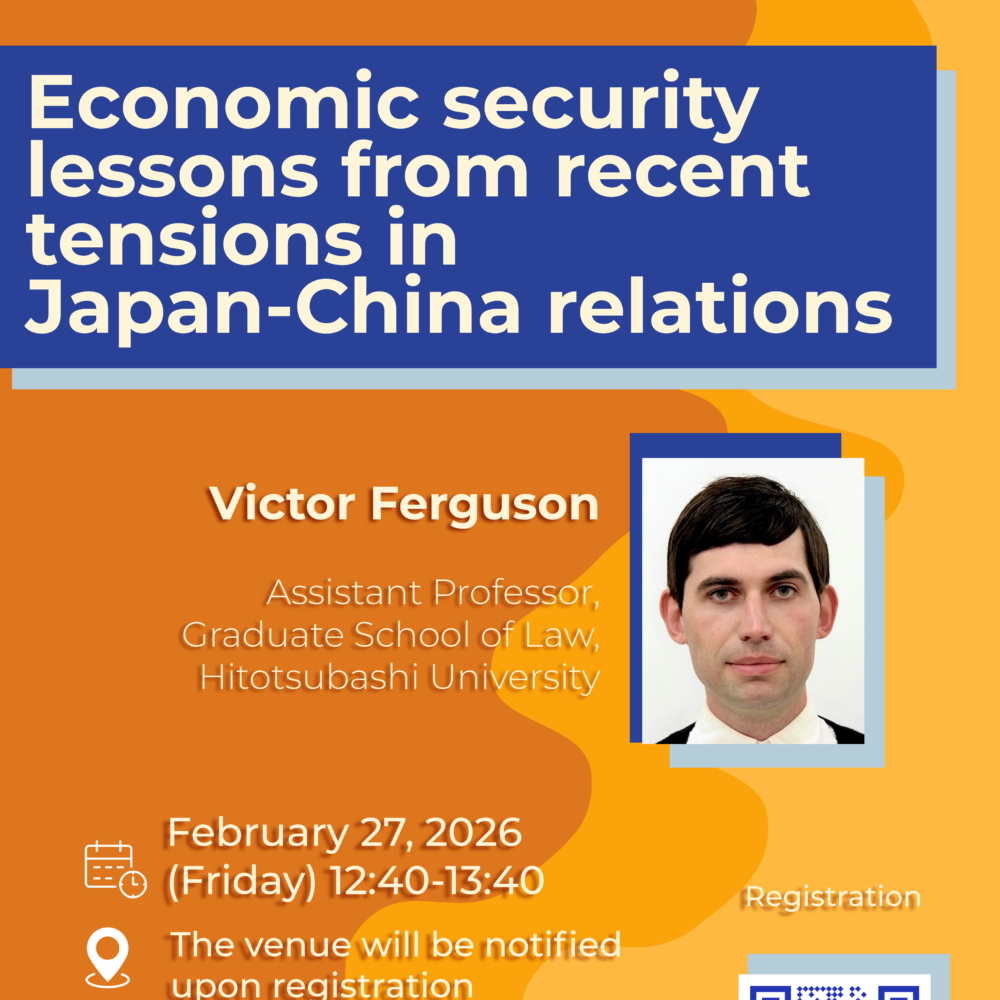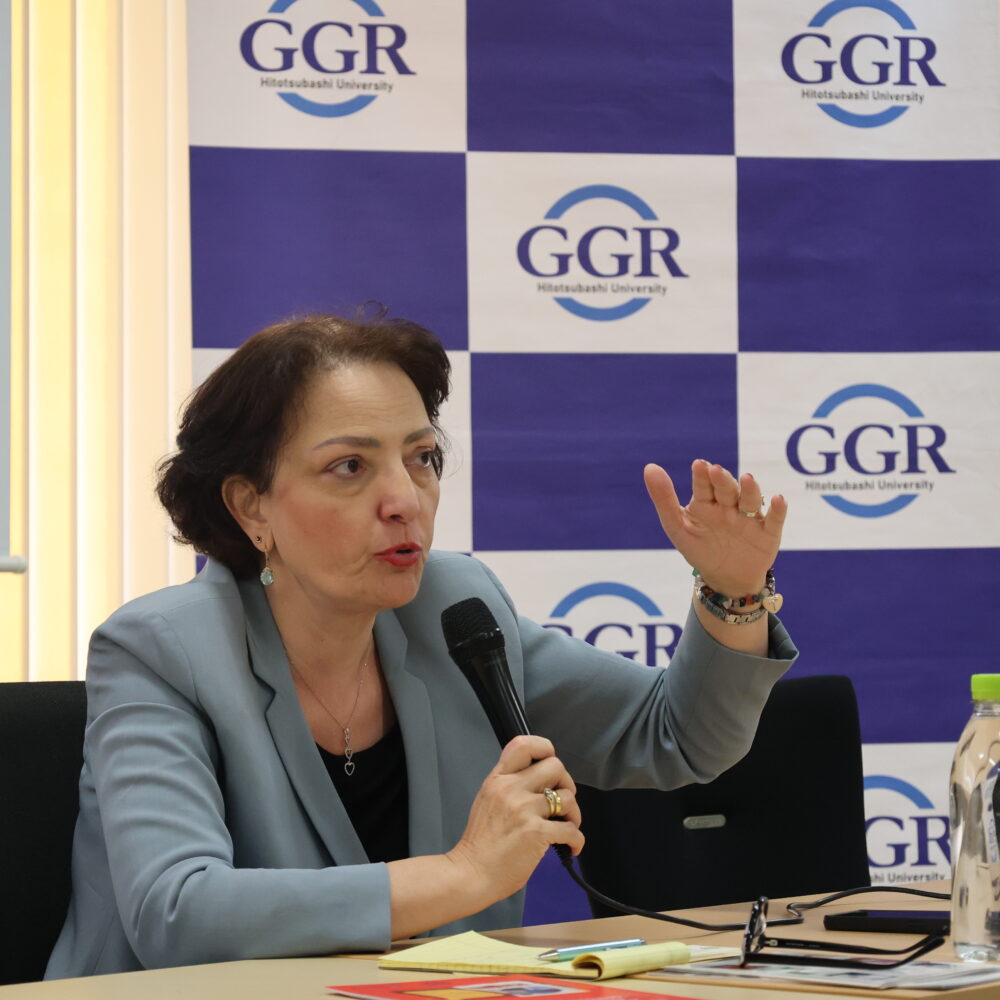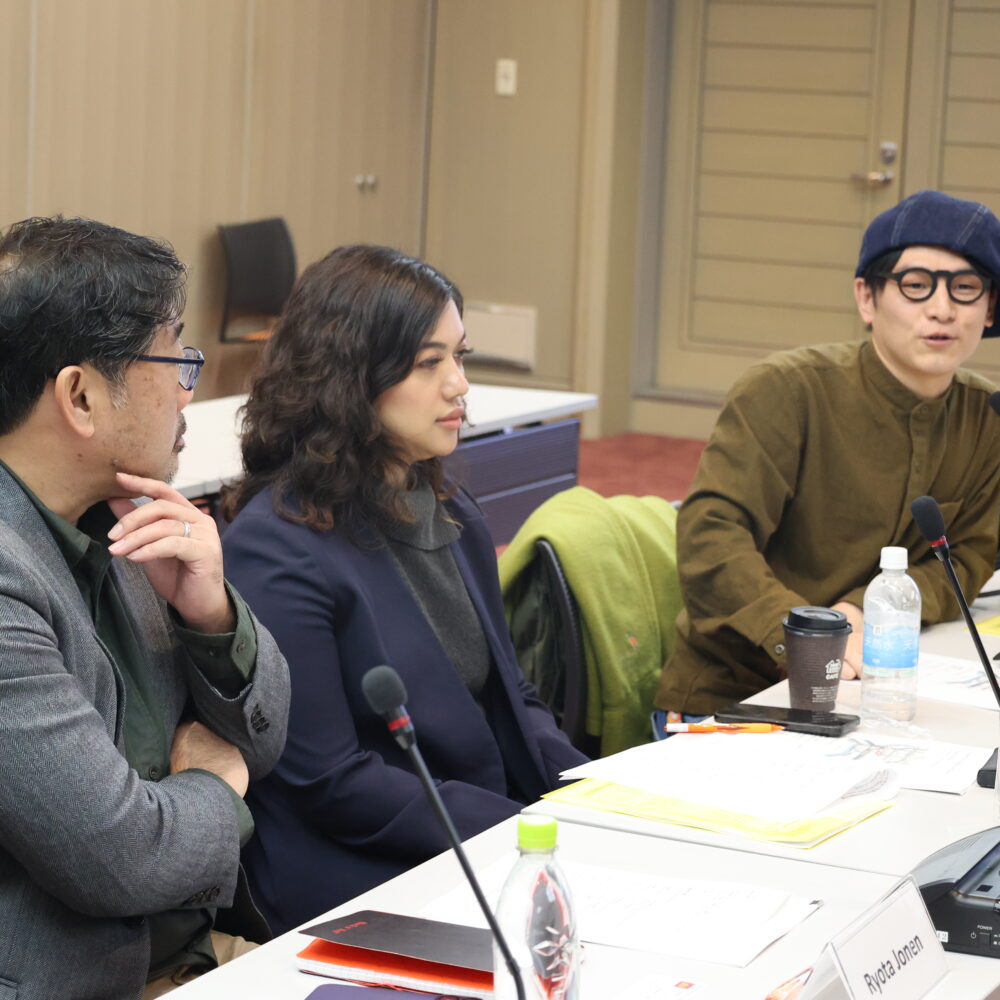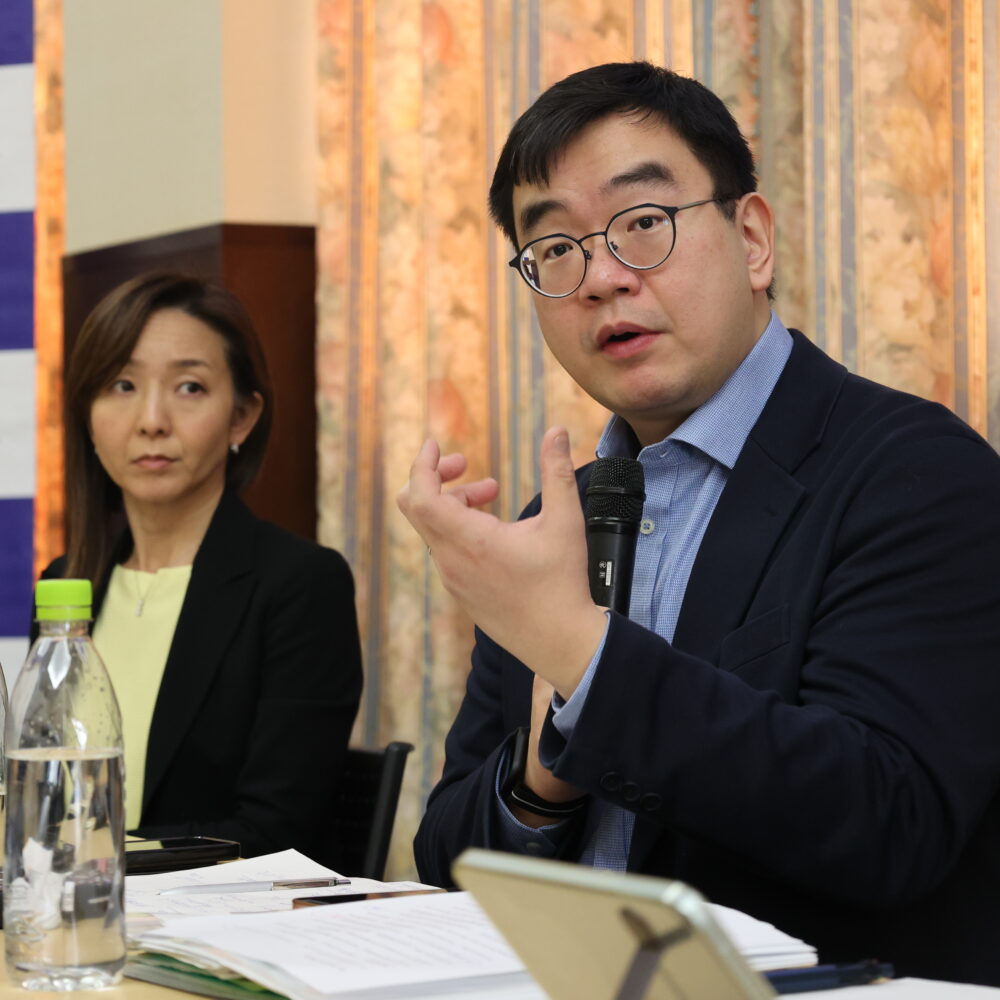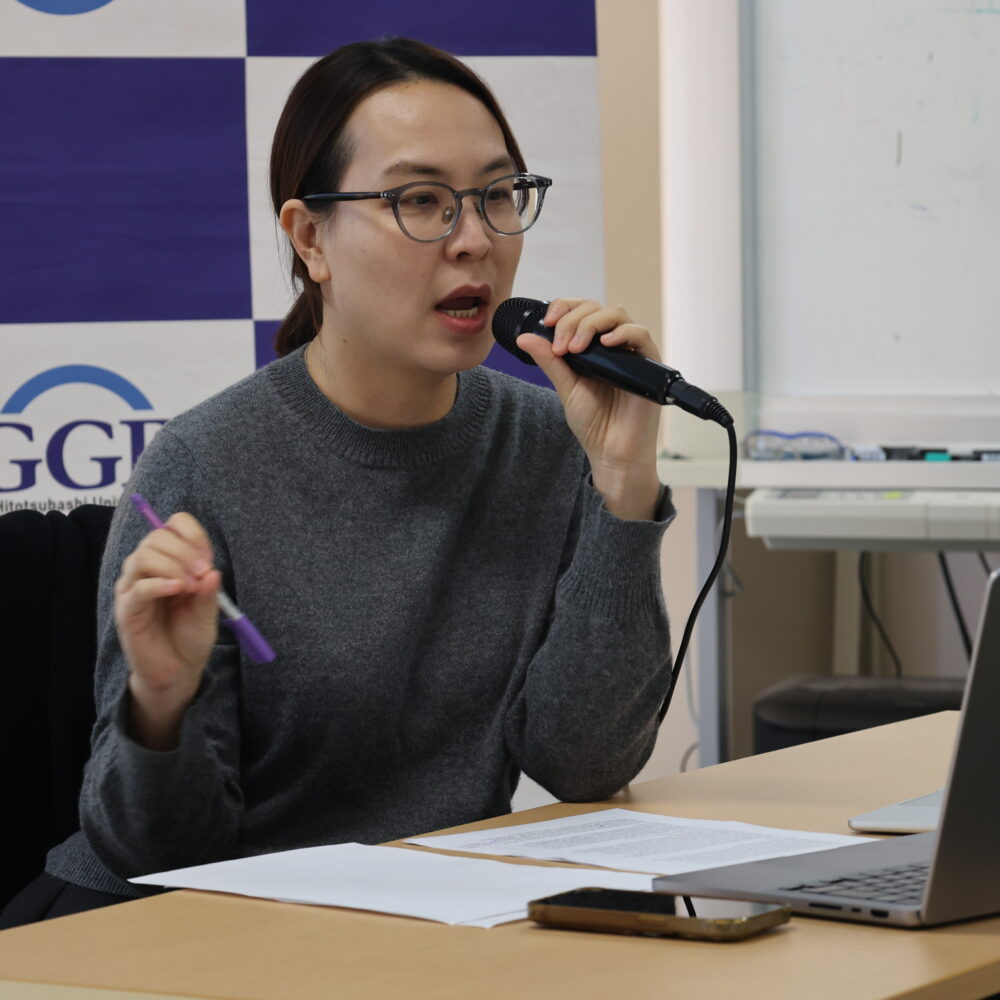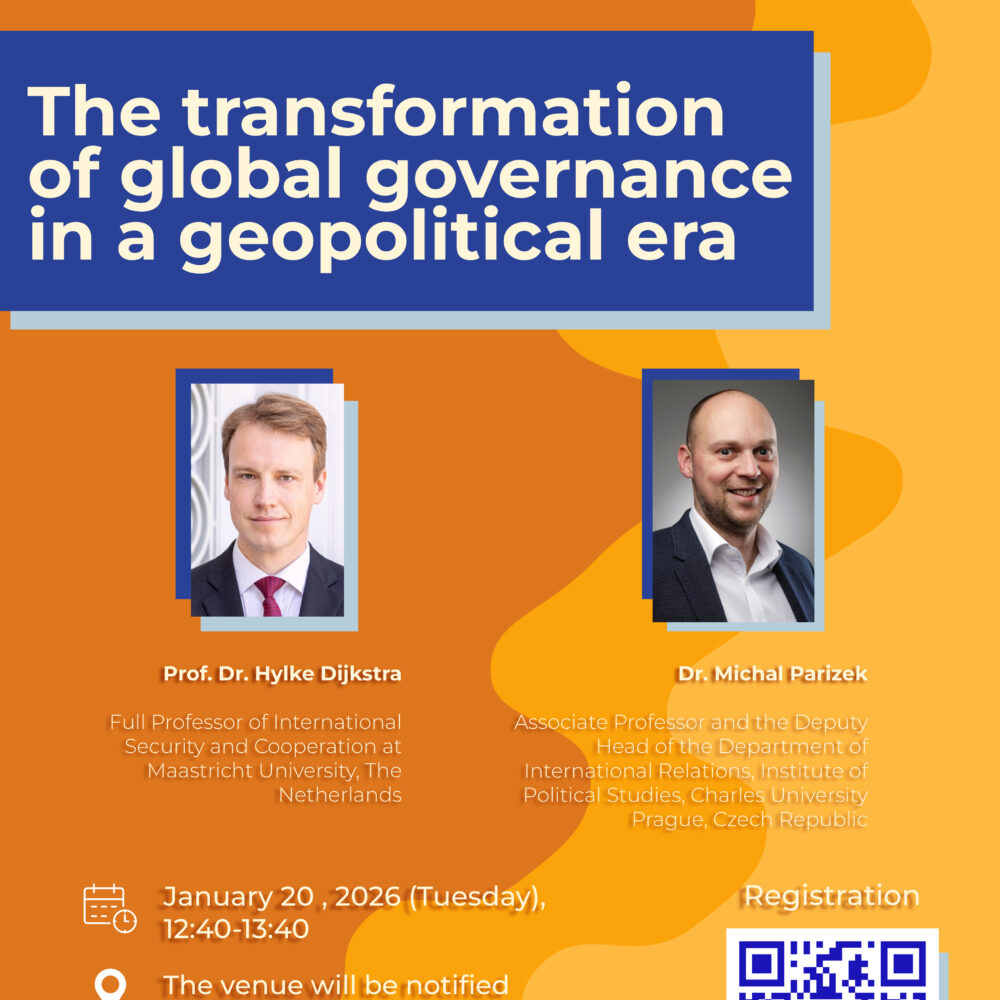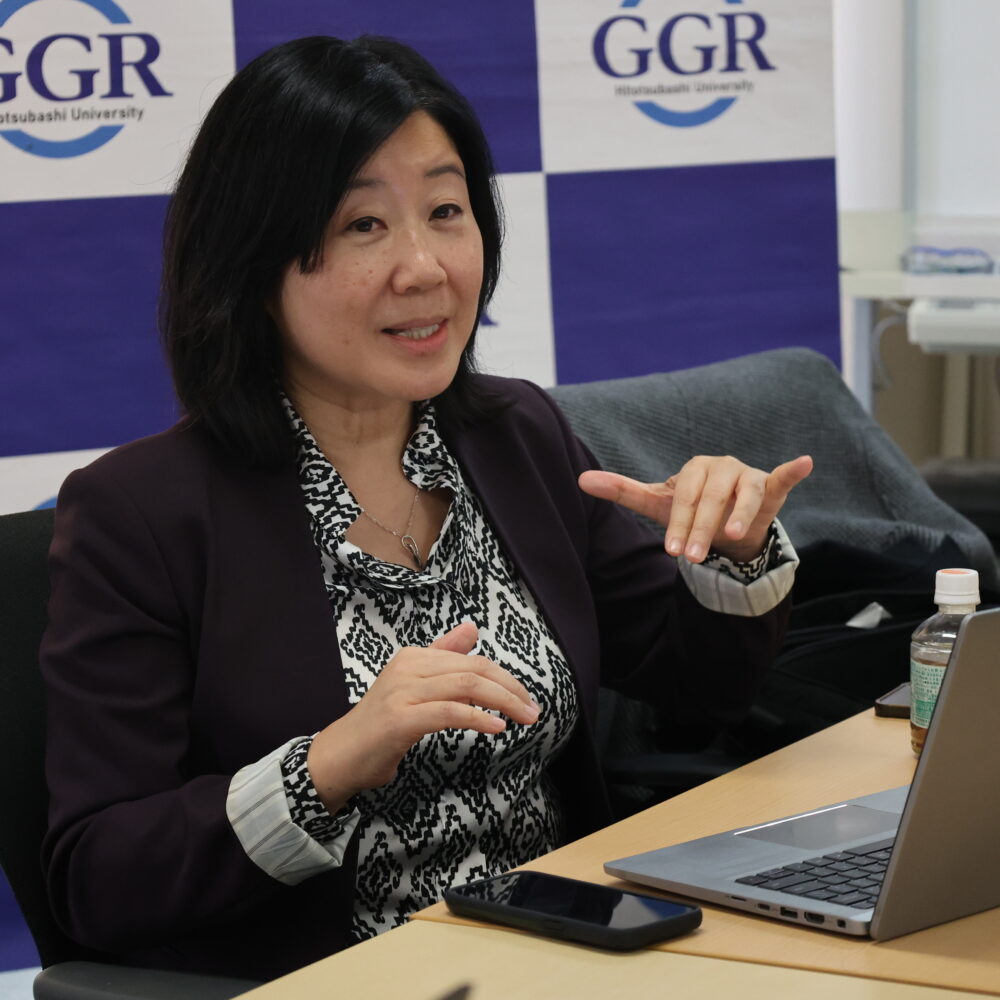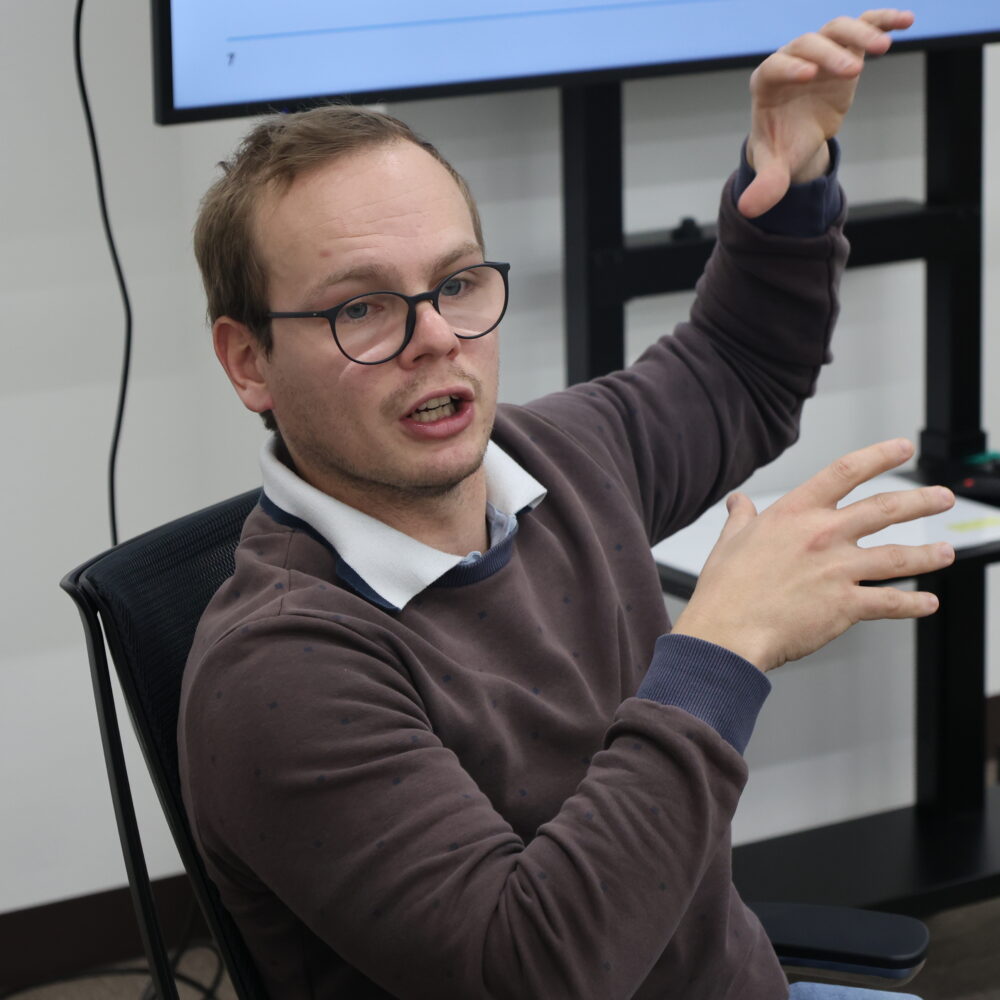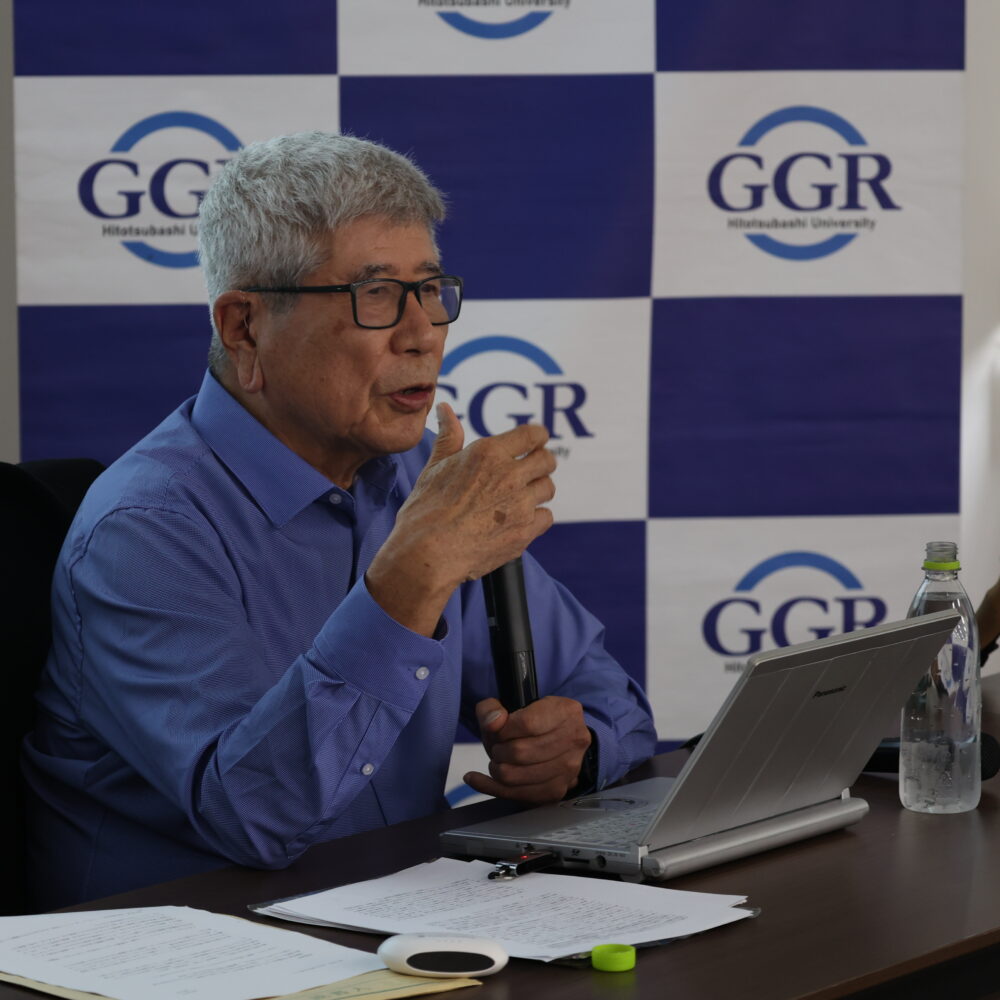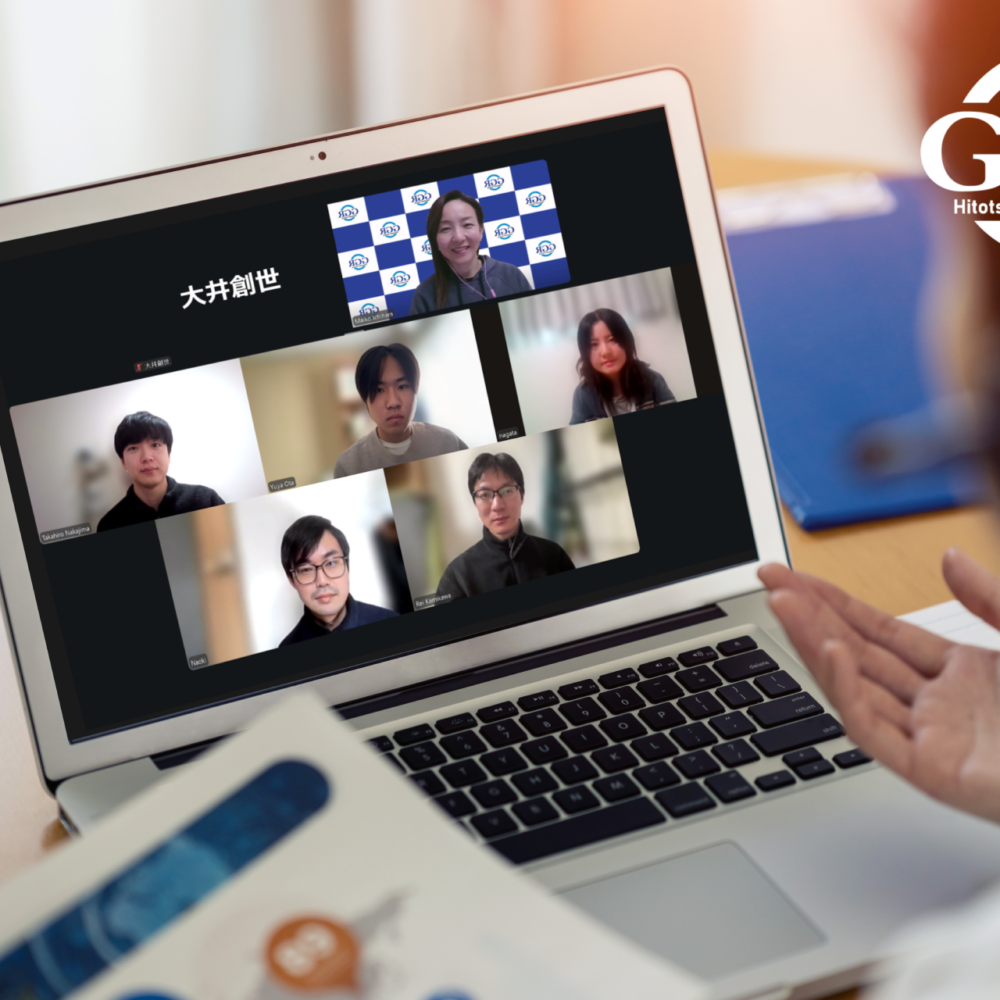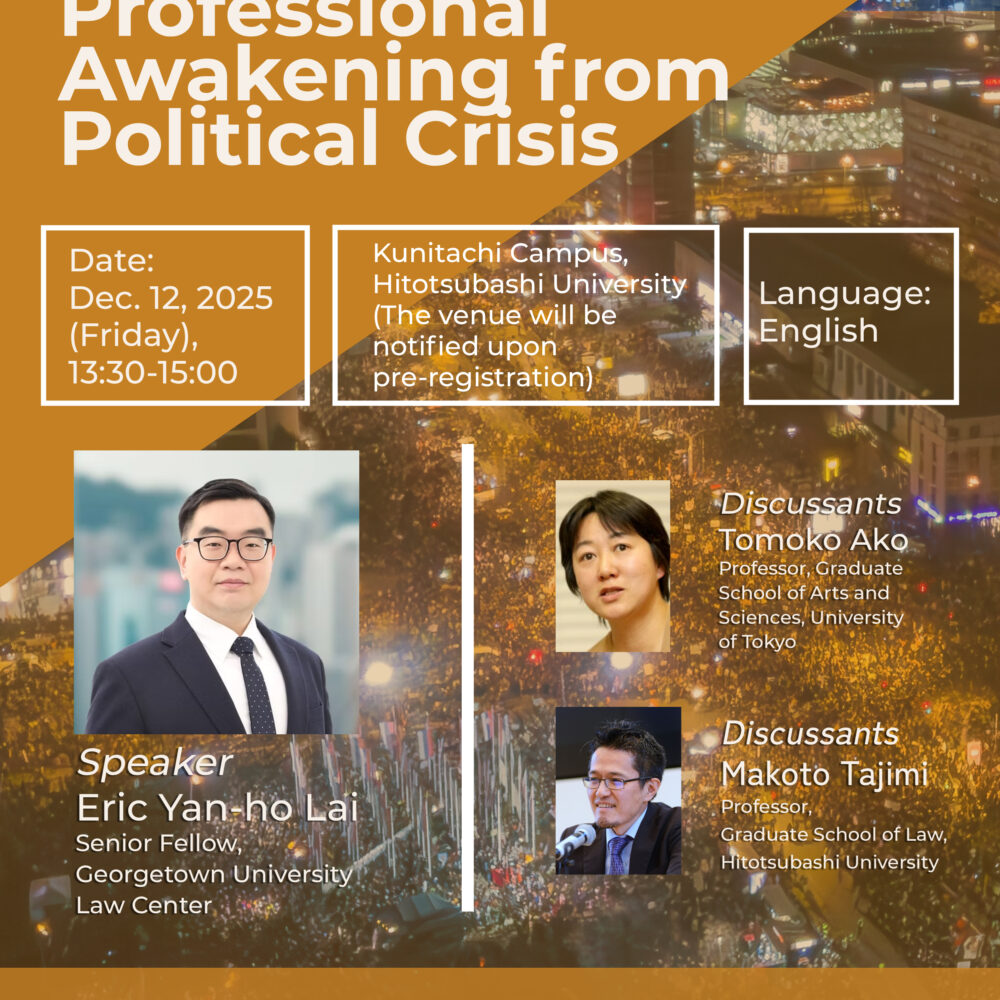Upcoming events
【GGR Brown Bag Seminar】Economic security lessons from recent tensions in Japan-China relations
Event date:February 27, 2026 (Friday)
Past Events
【GGR Talk Session】Small States in Turbulent Regions: Lessons from Georgia’s Current Political Challenges
Event date:December 2, 2025
Democracy and Human Rights Program
Democracy and Human Rights Program
【GGR Brown Bag Lunch Seminar】How Voters Shape U.S. Trade Policy: Public Opinion and Protectionism in Trump 2.0
Event date: November 7, 2025
【The 47th GGR Brown Bag Lunch Seminar】The Transformation of Global Governance in a Geopolitical Era
Event date:January 20th, 2026 (Tuesday)
Democracy and Human Rights Program
【GGR Brown Bag Lunch Seminar】Making a Case for Democracy Assistance in This New Era
Event date:November 18, 2025
[GGR Talk Session]The Role of Ideology in Soviet Policy During the Cold War
Event date:October 13, 2025
Democracy and Human Rights Program
【GGR Intensive Seminar】Countering Disinformation and Protecting Democracy: Follow-Up Session: The 22nd Zoom Meeting
Event date:December 13, 2025
Democracy and Human Rights Program
【RCSP/GGR Talk Session】Professional Awakening from Political Crisis:Legal Resistance under Authoritarianism Book Launch
Event date:December 12, 2025 (Friday)
News
Democracy and Human Rights Program
Comment on “DPP Withholds Endorsement of Shiori Yamao — Press Conference Fails to Quell Criticism” [in Japanese]
February 16, 2026
On June 11, 2025, a comment by Professor Maiko Ichihara (Graduate School of Law) on the Asahi Shimbun article, “DPP Withholds Endorsement of Shiori Yamao — Press Conference Fails to Quell Criticism” was published. The article reports that the Democratic Party for the People (DPP) decided at its joint parliamentary meeting on June 11 to withhold its endorsement of former House of Representatives member Shiori Yamao, who had been expected to run in the upcoming House of Councillors election under the national proportional representation system. Professor Ichihara noted that Yamao’s past extramarital affair had already been public knowledge before her provisional endorsement, and that party leader Yuichiro Tamaki had faced similar allegations himself. She suggested that the decision to withdraw support may have been driven less by the affair itself and more by unexpectedly strong backlash from the party’s newly acquired soft-right support base. She also pointed out the gendered nature of public criticism surrounding extramarital affairs, warning that the party’s decision could be seen as endorsing that imbalance.
Appearance in “Content control and authoritarian regionalism | Danielle Flonk and Stephanie Hofmann.”
February 16, 2026
On April 24, 2025, the Global Governance Programme EUI released a YouTube video titled “Content control and authoritarian regionalism | Danielle Flonk and Stephanie Hofmann,” featuring FLONK Daniëlle, Assistant Professor, Hitotsubashi Institute for Advanced Study (HIAS). In the video, Dr. Flonk explains how authoritarian states such as China and Russia are shaping the digital order through international institutions. Dr. Flonk notes that China and Russia aim to shift internet governance away from multi‑stakeholder settings toward intergovernmental bodies where they wield greater influence, and that they prioritize “information security” over “cybersecurity.” She also points out that both countries share a common strategy of investing heavily in regional alliances and international forums to export norms of censorship and digital control.
Democracy and Human Rights Program
Comment on “Peace and Cooking: Remi Hirano on Her Father’s Care for War-Affected Children” [in Japanese]
February 10, 2026
On June 8, 2025, a comment by Professor Maiko Ichihara (Graduate School of Law) on the Asahi Shimbun article, “Peace and Cooking: Remi Hirano on Her Father’s Care for War-Affected Children.” was published. The article introduces the 80th anniversary of the end of World War II and features culinary personality Remi Hirano reflecting on her father, Imao Hirano, who supported children born to U.S. soldiers and Japanese women in Japan after the war. Professor Ichihara expressed deep respect for Imao Hirano’s care for children with no personal or familial ties to him—children he welcomed into his home and treated with kindness. She emphasized that empathy, open communication, and altruism are key to fostering a more compassionate society.
Democracy and Human Rights Program
Comment on “No One Wants a Riot’: Protesters Step In to Calm Tensions at Los Angeles Demonstration” [in Japanese]
February 02, 2026
On June 10, 2025, a comment by Professor Maiko Ichihara (Graduate School of Law) on the Asahi Shimbun article, “No One Wants a Riot’: Protesters Step In to Calm Tensions at Los Angeles Demonstration” was published. The article reports on protests in Los Angeles, California, sparked by mass immigration raids. While the Trump administration’s deployment of National Guard troops has fueled further backlash, the piece also highlights efforts among demonstrators to promote peaceful protest. Professor Ichihara referenced the 2019 anti-extradition protests in Hong Kong, warning that actors seeking to deepen national division and unrest may infiltrate demonstrations and incite violence under the guise of protest. She emphasized the importance of anticipating such tactics, resisting provocation, and cultivating resilience to avoid being misled or drawn into escalation.
Democracy and Human Rights Program
Comment on “‘I’ve Never Bought Rice’: Minister’s Words Stir Public Anger” [in Japanese]
January 26, 2026
On May 19, 2025, a comment on the Asahi Shimbun article “‘I’ve Never Bought Rice': Minister’s Words Stir Public Anger.” by Professor Maiko Ichihara (Graduate School of Law) was published. The article reported on widespread anger and backlash from farmers and consumers following remarks made by then-Minister of Agriculture, Forestry and Fisheries Taku Eto on May 18, in which he stated, “I’ve never bought rice.” Professor Ichihara highlighted the difficulties faced by volunteer organizations such as children’s cafeterias and homeless support groups in distributing rice due to soaring prices. She suggested that, in addition to stepping down from his post, Mr. Eto should consider donating rice to these organizations.
Global Risk and Crisis Management Program
Strategic Deadlock in Iran’s Nuclear Talks: Commentary by Prof. Nobumasa Akiyama (Japanese)
January 23, 2026
On June 16, 2025, Professor Nobumasa Akiyama (Graduate School of Law) was interviewed for an NHK article titled “Israel Launches Renewed Strikes — Possible Contamination Inside Iranian Nuclear Facilities.” This interview was conducted in response to the cancellation of the sixth round of high-level talks between the United States and Iran concerning Iran’s nuclear development program. Professor Akiyama noted that, given the current situation in which Iran is under attack by Israel, it is unlikely that Iran would agree to negotiations under the U.S. condition of a complete abandonment of its nuclear development program. He pointed out that Iran faces a dilemma in which both proceeding with and withdrawing from negotiations present serious challenges. While the incentive for Iran to pursue nuclear weapons has grown, he added, the country also has strong reasons to avoid international isolation.
Democracy and Human Rights Program
Comment on “So Afraid of Phone Calls They Want to Quit: The Anxiety and Sense of Responsibility Felt by the SNS Generation” [in Japanese]
January 23, 2026
On May 12, 2025, a comment on the Asahi Shimbun article titled “So Afraid of Phone Calls They Want to Quit: The Anxiety and Sense of Responsibility Felt by the SNS Generation.” by Professor Maiko Ichihara(Graduate school of law)was published. The article explores the reasons why members of the SNS generation feel pressure and discomfort when handling phone calls, drawing on interviews with affected individuals and experts. Professor Ichihara acknowledged that everyone has areas they struggle with, and emphasized the importance of creating workplace environments where young people can adapt to social life without undue stress. She suggested, for example, that phone-related tasks should be distributed thoughtfully to avoid placing the burden on a single individual.
Democracy and Human Rights Program
Comment on “Denmark Summons Acting U.S. Ambassador Following Reports of Intelligence Expansion in Greenland” [in Japanese]
January 20, 2026
On May 9, 2025, a comment on the Asahi Shimbun article “Denmark Summons Acting U.S. Ambassador Following Reports of Intelligence Expansion in Greenland” by Professor Maiko Ichihara (Graduate school of law) was published. The article reports that, following revelations that the Trump administration had ordered increased intelligence operations in Greenland, a self-governing territory of Denmark, the Danish Ministry of Foreign Affairs summoned Acting U.S. Ambassador Godfrey to request an explanation. Professor Ichihara stated that if the Trump administration is conducting intelligence activities related to Greenland’s independence movement with the intention of using that information to incite the movement through influence operations, such actions would be entirely in line with the tactics employed by Russia and China—and therefore cannot be overlooked.
Global Risk and Crisis Management Program
Israel Launches Renewed Strikes — Possible Contamination Inside Iranian Nuclear Facilities (Japanese)
January 15, 2026
On June 13, 2025, Professor Nobumasa Akiyama (Graduate School of Law) was interviewed for an NHK article titled “Israel Launches Renewed Strikes — Possible Contamination Inside Iranian Nuclear Facilities.” The article reports that, on the same day, the Israeli military announced it had carried out strikes on over 100 targets across Iran, including nuclear-related facilities. It covers the extent of the damage, international reactions, and potential economic impacts. Professor Akiyama suggested that the attack may have been aimed at broadly dismantling Iran’s nuclear program. He further noted that Iran might interpret the strikes as an assault on the nation as a whole, potentially reinforcing its perceived need for nuclear weapons. He expressed concern over the possibility of further escalation in the use of force.
Democracy and Human Rights Program
Comment on “’The LDP Should Explain to Citizens’ Constitutional Democratic Party Hold Emergency Meeting over Himeyuri Remarks” [in Japanese]
January 15, 2026
On May 8, 2025, a comment on the Asahi Shimbun article titled “‘The LDP Should Explain to Citizens’ Constitutional Democratic Party Hold Emergency Meeting over Himeyuri Remarks,” by Professor Maiko Ichihara(Graduate school of law)was published. The article reports on a controversy surrounding remarks made by LDP Upper House member Shoji Nishida, who referred to the exhibits at the “Himeyuri no Tō” memorial—dedicated to students who perished in the Battle of Okinawa—as “a rewriting of history.” The article highlights calls for Nishida to retract his statement and issue an apology. Professor Ichihara pointed out that Nishida’s remarks constitute misinformation that fosters division between Okinawa and the rest of Japan, and warned that such comments could be exploited by actors seeking to undermine democratic society. She urged Nishida to revisit the Himeyuri memorial and museum to correct his misunderstanding, and called on the LDP to encourage him to do so.

